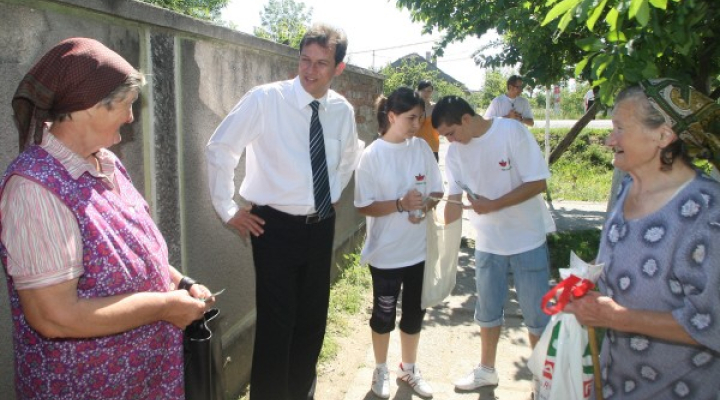Csaba Sógor's campaign-2009
"We represent every Hungarian living in Romania," declared European parliamentary candidate Csaba Sógor on Saturday during a tour of settlements in Arad County [Judeţul Arad]. He added that when we speak of the elections on 7 June, we must not forget the Hungarians in Kárpátalja [Subcarpathia, Ukraine] and Vojvodina [Serbia]. "Although they cannot vote with us, we are all responsible for them just as we are for Hungarians in Hungary, Felvidék ["Upper Hungary"], Austria and Slovenia," stressed Sógor. He described 7 June as a historic moment as the Hungarians of the Carpathian Basin will vote together for the first time since the Treaty of Trianon, and, with the disappearance of borders, the Hungarian nation will once again be united.
At a public forum held in Simonyifalva [Satu Nou], Sógor spoke of
the defence of traditional national minorities. "Representatives of
these communities are trying to convince the majority in a peaceful way
and by parliamentary means that what is good for 14 countries of Europe
can be good for the whole territory of the European Union," observed
the European parliamentary candidate. "Through no fault of their own,
traditional national minorities ended up in a new country, without the
option of ever moving from the place they had lived in for centuries.
Nobody ever asked them if they would like to change their citizenship
or learn a new official state language. These traditional national
minorities are the most loyal citizens of the countries in which they
live.
Despite wars, economic crises, domestic political battles and assimilation, they did not desert their native lands, old or new. Loyalty for them remains unbroken. For precisely this reason, it is impossible to understand what tens of millions of people in these big countries have to fear from a minority of a few hundred thousand, perhaps half a million or one and a half million." Sógor asserted that various forms of self-regulation applied in the EU - the territorial or cultural autonomy which resulted from consensus politics between majority and minority - had not weakened the economic, political or social strength of the given countries, nor that of the European Union. "Romania exists in its present form since 1920. Some 28% of the population living in this territory was non-Romanian in 1930, but this number has now fallen to 10%. Several other EU member countries besides Romania are dealing with similar problems. Although there are laws and rights, it is not possible to guarantee that these can be embedded in practice, and yet linguistic, ethnic and regional diversity are European values. For this reason it is important that draft guidelines are created on the basis of already operating, tried and tested EU examples, which are acceptable to everyone and which do not violate the territorial integrity of the countries concerned," explained Sógor in outlining the planned activity of the next parliamentary cycle.
The European parliamentary candidate of Hungarian Solidarity (Magyar Összefogás) was set to continue campaigning in Temes County [Judeţul Timiş] on Sunday.











